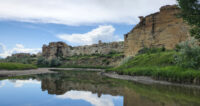Albertans want to know how to manage the demand on limited water resources
By Letter to the Editor on May 13, 2021.
Editor: The UCP government’s “sector by sector approach to economic stimulus” (Lethbridge Herald 30 April 2021 MLA Neudorf presents party’s sector-based approach for economic recovery) is out-of-date, and out-of-step.
It is this narrow focus on promoting one industry absent a broader land use, environmental, social and public interest context that made Alberta a petro-state and has brought the current frenzy of opportunistic proposals for coal exploration and extraction in our Eastern Slopes.
Thankfully many Albertans think more broadly.
The public conversation about coal, in spite of government attempts to constrain it, has expanded to include long-term impacts of open-pit coal mines on tourism, recreation, human health, biodiversity and climate.
No topic has evoked more concern than impacts on water.
Water flowing down from headwater tributaries to the rivers of semi-arid southern Alberta and on to Saskatchewan is arguably our most precious natural resource.
Water is the life blood of another industry sector being narrowly targeted for UCP government stimulus – irrigation agriculture. The province’s announcement in fall 2020 of an $815 million deal with the Canada Infrastructure Bank and eight irrigation districts in the Bow River and Oldman River basins boasts plans for new pipelines, reservoirs and a 15 per cent increase in irrigated acres. The amount of water needed to irrigate an additional 208,000 acres of cropland dwarfs the amount that would accommodate coal mine development.
Irrigation agriculture over the past 120 years has acquired licenses to withdraw over half of the mean natural annual flow in the Oldman River and Bow River that converge to form the South Saskatchewan River.
This one sector controls three quarters of all water allocated in these basins.
Because of over-commitments, since 2006 no new allocations have been allowed for any purpose because of risk of shortage for meeting existing commitments including a requirement to pass half of mean natural annual flow to Saskatchewan.
Rivers in southern Alberta are suffering from huge amounts of water extracted by the irrigation agriculture sector especially during prolonged dry periods.
With climate change, stress on rivers is predicted to increase as is the risk of shortage to meet existing licensed allocations and accommodate future population and economic growth.
Broad-thinking Albertans are asking how best to manage demand on our limited water resources to reduce, not increase, environmental, social and economic risk today and in the future.
Were these impacts or forgone opportunities for other sectors of our economy considered in government’s decision to focus on stimulating expansion of the irrigation agriculture sector?
Those of us who have asked are still waiting for answers.
Cheryl Bradley
Southern Alberta Group for Environment
-1




